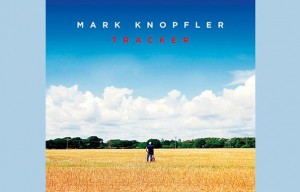The prospect of a new solo album by Mark Knopfler is one of nature’s less effective ways of setting the pulse racing. Knopfler is to hype what rain is to fire. Operating a full octave below ‘low-key’, by now the primary ingredients of his music – rootsy work-outs, bluesy growlers, wry shuffl...
The prospect of a new solo album by Mark Knopfler is one of nature’s less effective ways of setting the pulse racing. Knopfler is to hype what rain is to fire. Operating a full octave below ‘low-key’, by now the primary ingredients of his music – rootsy work-outs, bluesy growlers, wry shuffles, country and Celtic touches – are reassuringly fixed.
There are, however, gradations to his doggedly unflashy craft. The 2012 double album, Privateering, was a genial 20-track sprawl through Knopfler’s arsenal, running wide rather than terribly deep, leaning heavily on sturdy blues. Tracker, while never deviating far from established expectations, possesses a different quality. An album threaded with themes of transience and ruminations on time and memory, it’s richly melodic, lyrically involving, and boasts an unhurried elegance and quiet intensity which elevates it to the ranks of Knopfler’s most affecting work.
Befitting an album by a well-read member of rock’s awkward squad, two of Tracker’s highlights are character studies of literary outsiders. On “Basil”, which begins in a haze of mandolins before proceeding towards a stately “Brothers In Arms” ache, Knopfler summons up the ghost of North-east modernist poet Basil Bunting, best known for his 1965 epic Briggflatts, whom he encountered while working as copy boy at the Newcastle Evening Chronicle. The distance between the pair – one, a cocky teen with the world at his feet; the other, a disillusioned poet with compromised ambitions – is laid out with sharp-eyed empathy, Knopfler peppering his recollections with details of “five cigarettes and two silver half-crowns”, and the unforgettable triumph of “kissing a Gateshead girl”.
“Beryl” is a more muscular pen portrait, revisiting another cornerstone of Knopfler’s legacy. Having stolen the intro – three raps on the hi-hat and a single snare shot – from “Sultans Of Swing”, it duly pilfers that song’s key, tempo and stripped down, bar-band boogie as well. It’s a fitting setting for a bristling homage to the late Liverpool writer Beryl Bainbridge, awarded a posthumous honour by the Booker Prize committee but unfairly overlooked while alive, according to Knopfler, who chides: “It’s too late, ya dabblers, it’s all too late”.
If a chippy class warrior still resides within this 65-year-old multi-millionaire, so does an unabashed music fan. The easy, undemanding groove of “Broken Bones” nods heavenwards to JJ Cale, an enduring influence who died in 2013. More significantly, perhaps, much of Tracker was written during a period of sustained touring with Bob Dylan. Though their association dates back to 1979, Knopfler’s radar remains alert for incoming traffic. “Lights Of Taormina”, a charmingly weathered reflection from the Sicilian town, sounds like a campfire version of “Just Like Tom Thumb Blues”. “River Towns”, meanwhile, has the steady roll of latter-day Dylan, and a protagonist “looking in the mirror at the face that I deserve” to boot. They’re two of several excellent, emotive songs written from the perspective of rootless men. The elliptical “Silver Eagle” frames a moment of transient tenderness recalled from a bus rolling through America; “Mighty Man” honours the itinerant escapades of a scarred Irish navvy, aptly framed by a reinterpretation of the traditional standard “She Moved Through The Fair”; “Wherever I Go”, a graceful country ballad sung with Rth Muoody from The Wailin’ Jennys, finds two souls crossing paths briefly on the road, their emotional bond undiluted by physical distance.
It’s serious stuff, but beautifully realised. There’s room for some nifty musical footwork on the wryly nostalgic “Laughs And Jokes And Drinks And Smokes”, which sounds like Dave Brubeck’s “Take Five” uprooted to some ’baccy-stained folk club. The incongruous “Skydiver”, meanwhile, is a reminder that Knopfler knows his pop coordinates. A Ray Davies-esque study of a carefree gambler, its nifty descending chord sequences are lit up by cascading harmonies.
It adds up to a little more than just another solid Mark Knopfler offering. His eighth solo album will no doubt satisfy dedicated fans, but for those lulled into inattentiveness somewhere along the way, Tracker also makes an excellent case for re-engagement.
Q&A
MARK KNOPFLER
There seems to be a real unity of themes on this record.
It has to do with time and memory, that’s a big part of it. As you get older you view time differently, it becomes more of a reverse telescope. I also end up here and there with Northern themes. They’re part of my background and they do inform the songs.
What prompted you to write about Beryl Bainbridge and Basil Bunting?
I’d be standing right behind Basil as a copy boy, and it was clear that he didn’t want to be there. He was writing Briggflatts then, which is a meditation on time and abandoned love. I was 15, and at that age the world is a rosy promise, whereas I think he was seeing it from the other side. The road ahead was shorter than the one he left behind. Beryl also had to do with time, because back then there was an Oxbridge prejudice. She was self-deprecating, a working class Liverpool girl who never went to university. Maybe she realised how mighty she was, but she didn’t want to make a thing about it.
How was touring with Dylan?
It definitely helped me produce a couple of songs: “Lights of Taormina” and “Silver Eagle”, I wouldn’t have written that otherwise. I was back touring on buses again and I started writing about from that perspective.
INTERVIEW: GRAEME THOMSON



